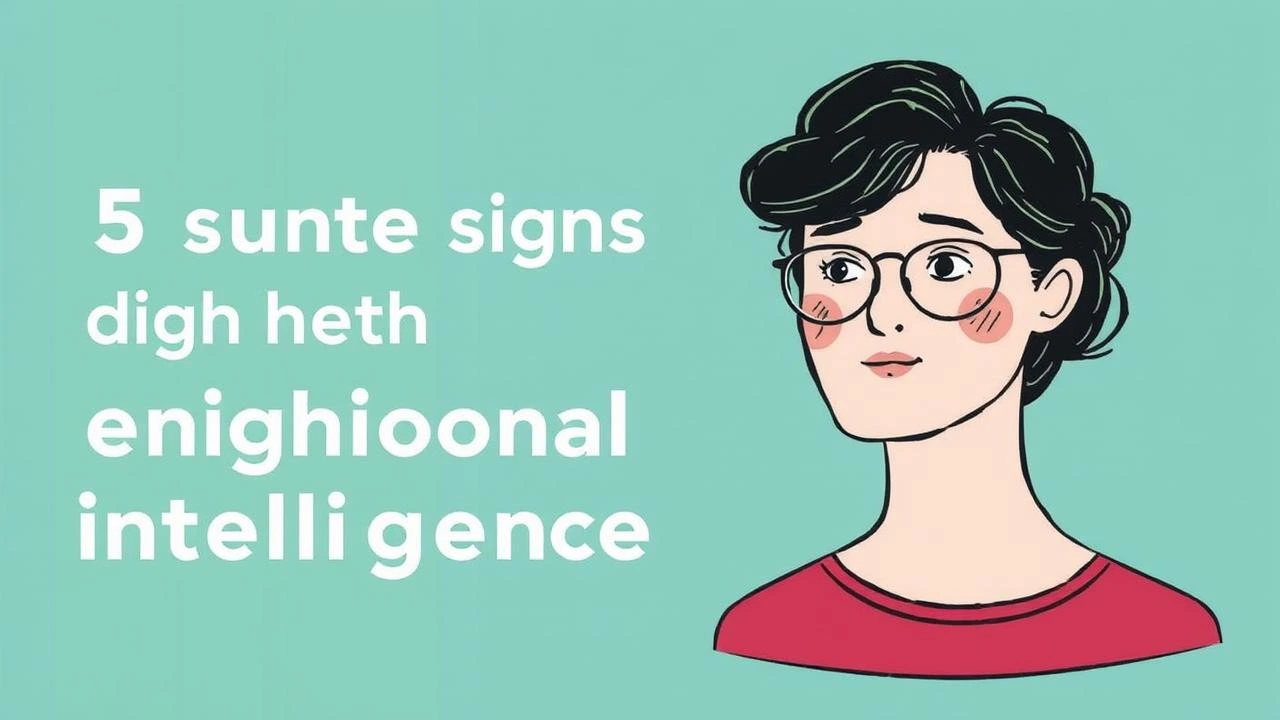In a world that seems increasingly dominated by the quest for intellectual prowess, emotional intelligence (EQ) has quietly emerged as a critical non-cognitive skill. While IQ might get you through school and into prestigious positions, EQ is what allows individuals to navigate social complexities and make personal connections. Emotional intelligence is often characterized by one’s ability to recognize, understand, and manage emotions – both their own and those of others.
But how can one identify signs of high emotional intelligence? Unlike IQ, which can be measured precisely through standardized tests, emotional intelligence reveals itself in more subtle, everyday behaviors. Below are five significant indicators of a person possessing high emotional intelligence.
1. Active Listening
One of the most telling signs of high EQ is the ability to actively listen. Individuals with strong emotional intelligence pay attention to what is being said, not just on a surface level, but emotionally as well. They seek to understand the underlying feelings behind the words. Active listeners maintain eye contact, nod in agreement, and refrain from interrupting, creating a comforting space for the speaker to express themselves.
“Most people do not listen with the intent to understand; they listen with the intent to reply.”
— Stephen R. Covey
Characteristics of Active Listeners:
- Non-verbal Communication: Engaging body language such as leaning in and maintaining eye contact.
- Feedback: Offering thoughtful responses or questions reflecting the speaker’s emotions.
- Distraction Management: Avoiding distractions, such as phones or side conversations.
2. Empathy
Empathy is often referred to as the cornerstone of emotional intelligence. Being empathetic means genuinely putting oneself in another person’s shoes and understanding their feelings, thoughts, and perspectives. This isn’t merely about feeling sorry for someone; it’s about sharing in their emotional experience.
Ways Empathy Manifests:
- Non-judgmental Attitude: Accepting others without casting judgment, encouraging open dialogue.
- Comforting Presence: Offering emotional support during difficult times, even through a simple gesture or word.
- Genuine Curiosity: Asking questions to explore another person’s thoughts and emotions.
3. Emotional Regulation
People with high emotional intelligence possess a remarkable ability to regulate their emotions. Instead of being swayed by anger, frustration, or sadness, they can manage these feelings and respond appropriately. This emotional regulation leads to more productive conversations, healthier relationships, and effective conflict resolution.
Strategies for Emotional Regulation:
- Mindfulness Practices: Engaging in meditation or deep-breathing exercises to maintain calmness.
- Self-Reflection: Taking the time to assess one’s emotional responses and understanding triggers.
- Positive Self-Talk: Encouraging oneself to adopt a constructive inner dialogue after challenging situations.
4. Open-mindedness
Open-minded individuals often display a high level of emotional intelligence. They are willing to hear different perspectives, challenge their own beliefs, and learn from others. This adaptability not only strengthens working relationships but also promotes a culture of collaboration and innovation.
Signs of Open-mindedness:
- Acceptance of Diverse Opinions: Valuing and respecting differing viewpoints without backlash.
- Willingness to Change: Adapting to new ideas and approaches instead of clinging to rigid thoughts.
- Engagement in Dialogue: Seeking conversations that push boundaries and ignite thoughtful discussions.
5. Constructive Feedback Delivery
Individuals with high emotional intelligence know the importance of giving and receiving constructive feedback. They understand how to communicate their thoughts tactfully and kindly, ensuring the other person feels valued while also recognizing any areas for growth.
Effective Feedback Techniques:
- Use of “I” Statements: Communicating personal feelings and observations without placing blame (e.g., “I feel that…” vs. “You always…”).
- Balanced Approach: Pairing compliments with areas for improvement to promote a positive outcome.
- Encouraging Reflection: Asking questions that prompt the individual to think critically about their actions.
Conclusion
Understanding and recognizing emotional intelligence can offer a significant advantage in both personal and professional relationships. While high EQ individuals might not be the loudest voices in the room, their subtle signs become obvious over time. Cultivating these traits—active listening, empathy, emotional regulation, open-mindedness, and effective feedback—encourages a healthier emotional climate for everyone involved.
With a deeper appreciation for emotional intelligence, we can foster environments that celebrate and uplift one another through understanding and connection.
FAQs
1. Why is emotional intelligence important?
Emotional intelligence enhances interpersonal skills, improves communication, and leads to healthier relationships, both professionally and personally.
2. Can emotional intelligence be improved?
Absolutely! Like any other skill, emotional intelligence can be developed through practice, self-reflection, and learning from experiences.
3. What’s the difference between EQ and IQ?
IQ (intelligence quotient) measures cognitive abilities and intellect, while EQ (emotional quotient) refers to one’s ability to navigate social interactions and manage emotions.
Quick Summary Table
| Sign of High EQ | Description |
|---|---|
| Active Listening | Fully engages and understands others’ emotions |
| Empathy | Shares and understands others’ feelings |
| Emotional Regulation | Manages one’s emotions effectively |
| Open-mindedness | Accepts multi-faceted perspectives |
| Constructive Feedback | Offers feedback kindly and purposefully |
In conclusion, possessing high emotional intelligence equips individuals to build stronger relationships and navigate the complexities of human emotions effectively. Recognizing these subtle signs can not only help in personal assessments but also in selecting team members, partners, and friends who contribute positively to one’s emotional landscape. By fostering emotional intelligence, one can lead a more fulfilling, connected, and empathetic life.
5 subtle signs of high emotional intelligence (EQ)






